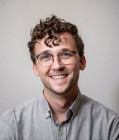New Member Spotlight: Saria Lofton Advocates for Food is Medicine Programs in Illinois
The Scholars Strategy Network is thrilled to spotlight a new and dedicated member of the network, Professor Saria Lofton. As an Assistant Professor of Population Health Nursing Science at the University of Illinois, Chicago, Lofton is committed to addressing health disparities through innovative policy solutions, focusing her work most recently on expanding access to food is medicine programs in Illinois.
Lofton first connected with the Scholars Strategy Network through her local Chicagoland chapter. She and a colleague, Lucy Peterson of the Illinois Public Health Institute, reached out for support on a co-authored OpEd. Together, they were able to publish their piece in the local Chicago Sun-Times, arguing that the state of Illinois should invest in food is medicine programs as a way to combat rising food insecurity and racial disparities.
As the authors explained, “Food is medicine programs feature the provision of nutrient-dense foods, in the form of groceries, produce boxes or meals, often within the context of a health care system. These programs can radically transform the way we care for people who are food insecure and who are at risk for, or have, chronic illnesses.”
Thankfully, last year the federal government announced a new policy that gave states the option to pilot programs that deploy food and nutrition services through their state Medicaid agencies. States could apply via a process known as a 1115 waiver. To expand access to food is medicine, Lofton and Peterson argued that we should all support Illinois’ 1115 waiver application and build further awareness of this program and its benefits.
Following the publication of their OpEd, Lofton and Peterson began outreach efforts aimed at key decision-makers in the state. They engaged with the Lt. Governor's office, fostering a fruitful relationship as the office was eager to learn more about the 1115 waiver and its implementation in Illinois, including gathering a list of food is medicine providers in the state. In addition to their OpEd, Lofton and Peterson have continued to work together to offer their expertise, including by submitting public comments to the National Institutes of Health and the Centers for Medicare & Medicaid Services on this topic.
In light of Illinois’ application for a 1115 waiver, Lofton and Peterson turned their attention to the difficult task of implementation to make the waiver a reality, partnering up once again to co-author a policy memo for dissemination at the Illinois Association of Medicaid and Health Plans meeting in September. The memo delves into the intricacies of food is medicine and the 1115 waiver, offering specific lessons based on the experiences of two other states who had previously implemented such programs. Lofton said of the memo: “People have been very supportive and it helped to elevate our message to our colleagues in the food is medicine space here in Illinois, [leading] to opportunities for further advocacy in the space.”
Lofton and Peterson’s collaboration first took root after presenting at a food justice summit in Chicago, where they both recognized the need for a call to action on the food is medicine front. A food is medicine committee, initiated through the Institute for Public Health Innovation, soon followed, and continues to hold quarterly meetings to allow for further collaboration.
Lofton's interest in food is medicine was ignited by conversations with a colleague who emphasized the importance of medically tailored meals for patients with end-stage renal disease. Her focus on diet, nutrition, and food insecurity, particularly among Black women, led her to delve deeper into this crucial intersection of healthcare and nutrition.
“It seemed to fit well with my research interests and I could see how the research nicely aligned with informing policy for food is medicine programs through provider reimbursements, to start,” said Lofton. “It also fits well with my background in urban agriculture, where food is medicine was often mentioned in different forms and I saw food is medicine as an opportunity to support urban agriculture efforts. This is where Lucy and I really connected in this space.”
Looking forward, Lofton remains committed to conducting evaluations on food is medicine and demonstrating its impact to help make the implementation of these programs through Illinois’ Medicaid program a success. She plans to continue working with decision-makers and reaching out to legislators to bring the 1115 waiver to fruition in Illinois.

Lofton is deeply committed to research focused on health promotion in the Black community, locally and internationally. Lofton uses a community-based participatory research approach to identify and leverage community assets while building local capacities. Her work has recently focused on understanding local food environments as essential in addressing chronic disease risk inequities for Black American youth and adults. Lofton has received internal funding to investigate urban agriculture in Black communities through the lens of community gardeners and farmers throughout Chicago. She has also received external funding through the NIH National Institute of Nursing Research to examine community-level factors that influence HIV risk behaviors in Malawi youth. Lofton's current research project, funded by the Center of Health Equity Chicago, builds upon the work she conducted with urban growers in urban agriculture.
